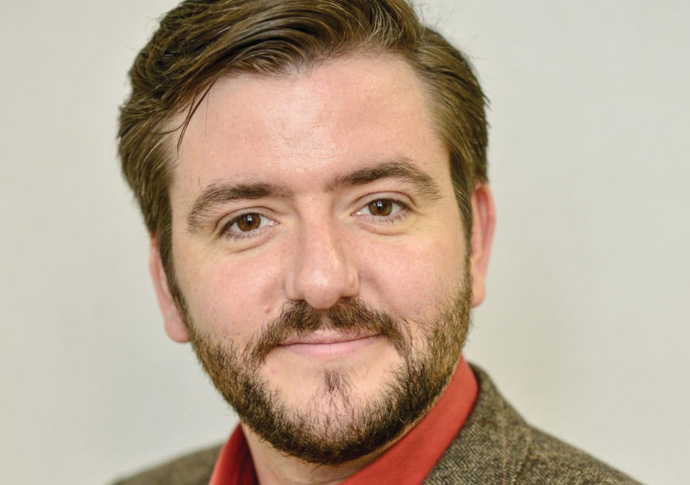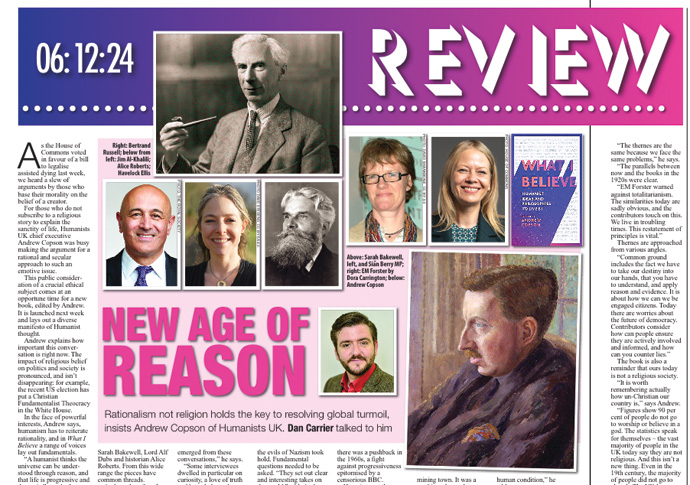You don’t have to be religious to be good
Andrew Copson insists that morality is part of our human biology and culture, rather than something handed down by religion
Friday, 7th March 2025 — By Andrew Copson

Andrew Copson
IS it impossible to be “good without God”? I am surprised at the number of people who believe it is not.
Many responding to the review of my book What I believe (New Age of Reason, December 6 2024) certainly were of that opinion.
The evidence of millions of good people in our country – and plenty in our own borough – practise exactly this every day should be evidence enough for the doubters, but in case it isn’t, I’m grateful to have the opportunity to address this question at greater length.
The humanist conviction is that moral behaviour arises from our connections with others, not from divine decree.
Humanists don’t believe in any supernatural source of commands or rules for being good. Morality instead, comes from thinking for ourselves about what sort of person we want to be, and what are the consequences of our actions.
Luckily most of us do consider how our actions impact others most of the time without really thinking about it and the evidence is that this tendency has its roots in our biology as well as in our culture.
Numerous studies in different fields of science have shown how humans have developed over time the skills of cooperation, affection, and all the basic behaviours needed to live in groups and thrive. Of course, basic social instincts are not the end of the story – culture is also necessary.
From Confucius to Epicurus, the idea that human beings, as social creatures, should care for one another is not a recent invention but very present in ancient human cultures. And the simple foundation of humanist morality – that we all have one life, and everyone should have the opportunity to enjoy it – has guided countless individuals throughout history.

Review of What I Believe in the Extra, December 6
To take a local example, Ernestine Mills, a committed humanist and suffragist who fought tirelessly for women’s rights, not because she believed she was commanded to do so by a higher power, but because she believed in justice and equality.
More recently, activists such as James Baldwin have used humanist arguments to advocate for civil rights, demonstrating that morality is a matter of shared humanity, not religious obedience.
In the absence of commandments, we must weigh up consequences using reason, experience, empathy, and respect for others. But the admission of personal responsibility does not mean that a humanist has no resources outside their own individual self to work with. We’re lucky that over the past few thousand years, a lot of people have thought extremely hard about these questions – and their wisdom comes down to us.
“Is there one principle which we should follow our whole life? Surely it is the rule of reciprocity: Don’t do to others what you would not like yourself.” – Confucius
Some may look around today and feel despair at the state of the world, but the broader trends show an undeniable moral advancements in recent centuries, and especially as religion has declined.
The advent of human rights, democracy, and international cooperation has created a world where, despite setbacks, justice and compassion can continue to expand. These ideas have been championed by humanists and secular thinkers who believe in the dignity and worth of every person, as well as by religious people of like mind.
A significant proportion of charitable organisations today are secular too, and many people volunteer their time and donate their resources not because of religious obligation, but because they care about others.
Beyond formal charities, everyday acts of kindness — helping a neighbour, smiling at someone in the street, supporting a friend in need — are carried out by most people. The impulse to help others is part of what makes us human.
Ultimately the humanist view of morality is empowering. It means asserting that human beings have it within us to work out what is the right and wrong thing to do – using reason, empathy, compassion, and respect for the dignity of every person.
Ideas of freedom, justice, equality, and fairness, are values that we can be proud of as human inventions, even as we strive and inevitably sometimes fail to live up to them.
• Andrew Copson, CEO of Humanists UK edited What I Believe: Humanist Ideas and Philosophies to Live By. Piatkus, £16.99